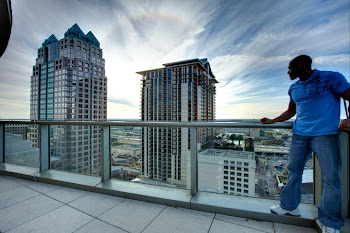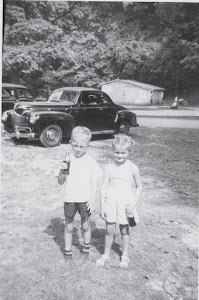 |
| Allan Ritchie with pike 1954 (Ritchie collection) |
Mr. Ritchie, who was a familiar participant in Chapleau parades, worked a large part of his life as a CPR telegraph operator at various relay points west and east of Chapleau. Allan Earland Ritchie died in may 1961.
I am delighted that through Brian Ritchie, Lark's brother, I am able to share "First Communion - Last Communion', written about time spent with his grandfather. It first appeared in www.kamazooie.com
'First Communion - Last Communion' by Lark Ritchie
On a Thursday evening in May, in the Spring of 1961, my mother fried some pike fillets and sent me with them to the Lady Minto Hospital. I brought them to my grandfather, who lay there in the last stages of cancer. I was twelve years old, and he, sixty seven.
"Hello", I said, as I entered his room. He opened his eyes and looked up with a short reply. "Hi Boy, sit down". I sat. He arranged himself, moving a pillow under his side, facing me. We both knew his conditions, though we did not talk about it.
A silence continued. We were used to silence, we had spent my life until that point as grandfather and grandson. Walking and sitting together; few words, long periods of silence, interspersed with teachings and play that helped make me who I am today.
I handed him a small brown paper bag. "Mommy made some fish for you," I mumbled, and handed the bag to him. He accepted the bag, and pulled out two packages wrapped in white translucent waxed paper. He unwrapped one. "Ooo, Fish", he said. His expression conveyed that this was an important thing, and that somehow, I was special for bringing it to him. "Where is it from? What kind?"
"It’s Pike," I replied, "From down the river."
"Who caught it?"
"Daddy caught it. Down past the rapids, in the weedbed near the beach."
We both knew that place; we had traveled the river and each bend, each weed bed was as familiar to us as the cupboards of our homes. For others who travel the river, that spot is on the east side of Henderson Lake, a small sand beach now used by hunters in the fall as a moose hunt campground.
Again we entered a moment of silence, as he broke a fillet into two. "Have some with me," and he handed me a small piece. "I already ate," I said, "we had it for supper." He offered it again, urging the fragment towards me, "Have just a little piece with me; it’s better to eat together."
I took it and ate it.
 |
| Allan Ritchie Chapleau carnival (Ritchie collection) |
He looked up, past the hospital ceiling towards a sky he saw in his mind, "We used to camp there, on that beach, it is a good place for a break; to cook." He wiped his lips, and then his eyes; first one, and then the other. "Across the river, there is a small bay; behind the island. It’s another good place to fish." And he told me a story of a fish he had caught there, and how he had used a green line and a sucker to catch it, and how it had flopped in the canoe. He told me one more; of a bear on a rock, just down the river a bit.
Our tears had passed, and he asked me about school, and what it was like outside. I do not remember what else we talked about, or when, or how I left. But it was the last time we ate together, and talked of fishing and hunting, of canoeing and camping. I saw him one more time; two days before the end. He was unaware.
We had shared a fish. Looking back at it now, it was an act of communion. A final sharing of knowledge, and being together. A passing. The basis of that communion was the river, and the life and lifestyle it provided. Two people connecting, two adjacent generations. Two ages of humanity; one moving into the past, one into the future, bound together by memories of a river. Saying goodbye.
This little story illustrates the central significance of the environment in many Native American lives. When in the last days of life, a man remembers and shares life and experience in the context and framework of a river, we begin to understand the subtle, yet vital interweaving of ecology and being, a fundamental entity in personal and social identity.
My very best wishes for a most blessed and Happy Easter, My email is mj.morris@live.ca



No comments:
Post a Comment